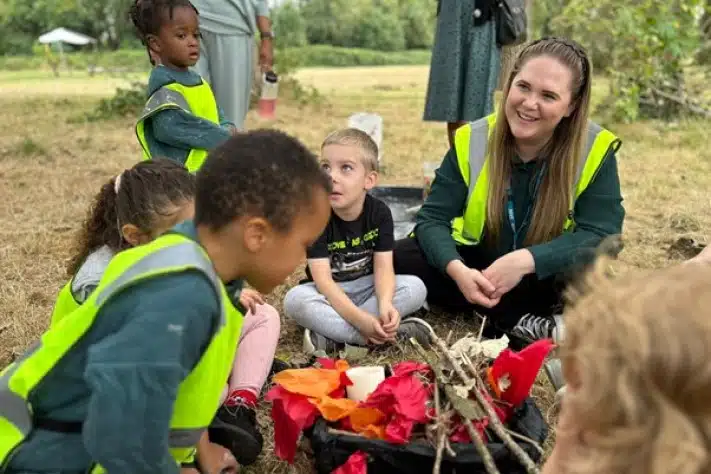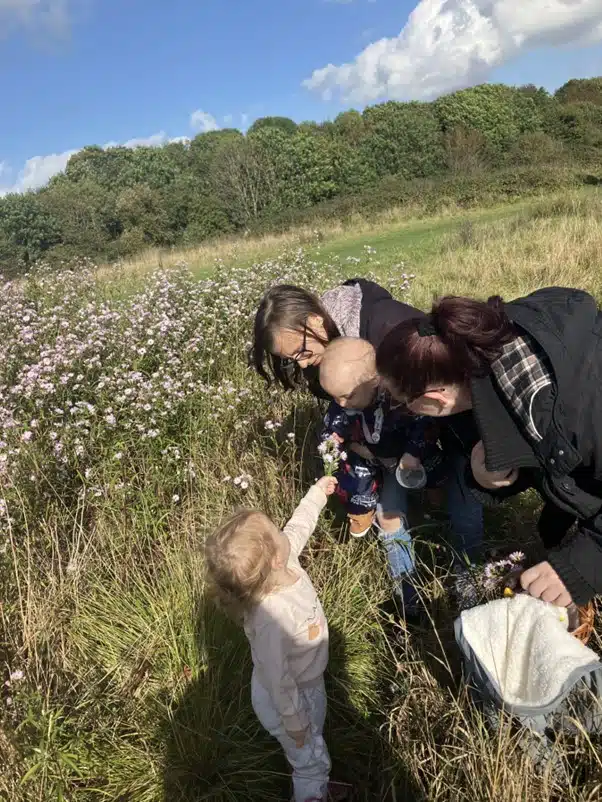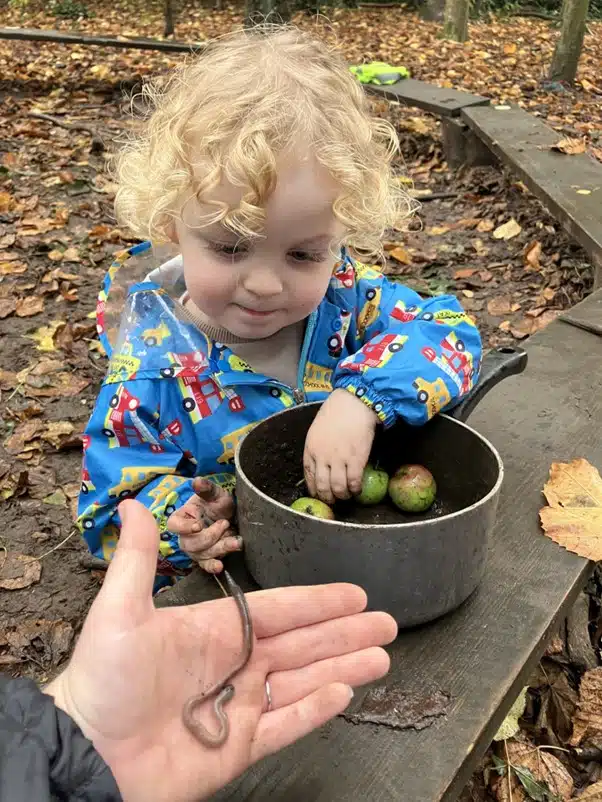17th January 2025
Green Social Prescribing and Mental Health, part two: Promoting Parent-Infant Relationships
We are delighted to share this Voices blog by Sophie Jack, Parent and Infant Mental Health Practitioner at South Warwickshire University Foundation NHS Trust, who shares information about the benefits and impact of Green Social Prescribing and parent-infant relationships.

Sophie Jack, Parent and Infant Mental Health Practitioner at South Warwickshire University Foundation NHS Trust, with children
In October 2023, Coventry received funding for the Family Hubs and Start for Life programme. The programme aims to meet commitments set out in “The best start for life: a vision for the 1,001 critical days”1, a key focus of which is infant mental health. Therefore, some of the funding was allocated to developing a specialist early intervention service to promote perinatal and infant mental health. I was inspired by my colleague, Louise Smith, who delivered a presentation on green social prescribing, and has set up a “Families Walk and Talk” (you can read Louise’s iHV Voices blog on her work, published on 10 January, here).
The COVID-19 pandemic highlighted the importance of being outdoors to promote people’s mental and physical health, as well as the inequality of access to a green space2. Based on these findings in 2021, the Environment Secretary announced a £4 million investment for a cross-government project aiming to prevent and tackle mental ill-health through green social prescribing. In a recent NHS England report3, green social prescribing is described as a tool to reduce the demand on health and social care systems, is not costly to implement, and could result in the NHS saving over £600 million pounds. The report also highlighted best practice in making green social activities more sustainable and accessible3.
This gave me an idea to use my skills, experiences and knowledge as a certified Forest School leader, to create a programme to promote parent-child relationships, and collaborative working across our local Family Hubs. Forest School is a child-centred, inspirational learning process which offers opportunities for holistic growth through regular sessions. It is a programme that supports play, exploration and supports risk taking. It develops confidence and self-esteem through learner-inspired, hands-on experiences in a natural setting. There is emerging evidence that attending Forest School can benefit various areas of child development and health and wellbeing outcomes, however, more evidence is needed to confirm these initial findings4.
The Institute of Health Visiting Emotional Wellbeing Visits intervention encourages exposure to nature to promote perinatal mental health. Walking in forests has been shown to improve immune, cardiovascular and respiratory system function, decrease symptoms of mood disorders and stress, and improve attitudes of gratitude and selflessness5. Just a 30-minute visit to a local green space per week can help reduce symptoms of depression6.
When I joined the Specialist Health Visiting Team for Parent and Infant Mental Health in October 2023 as parent-infant mental health practitioner, I was keen to hit the ground running with this exciting initiative. A fully funded programme, delivered by the Specialist Health Visiting Team for Parent and Infant Mental Health, is now offered to families city-wide (both universal and targeted approaches have been implemented). The programme is advertised through the digital communications team. Parents can self-refer, or the health visitor can refer to me directly.
During the 6-week programme, children and parents are encouraged to engage in creative play, socialise and get active. Other partners, such as speech and language therapists and lifestyle coaches from “Be Active, Be Healthy” also attend sessions to promote health and give advice and support to families.
The key aims of the sessions are to:
- Improve parent and infant mental health
- Enhance the parent-infant relationship
- Create opportunities for families to access their local green spaces
- Reduce social and health inequalities.

The programme started in June 2024 and, so far, six sessions have been offered. Two of these have been offered to families living in temporary accommodation in a local green space. 42 Families have engaged so far, and the feedback has been tremendous. All families said they would continue accessing their local green spaces after their sessions have finished.

Whilst the programme has not been formally evaluated in Coventry, it has received very positive feedback from parents which highlights how the initiative has the potential to strengthen the parent-infant relationship. Outcome measures could be a focus for the future.
Furthermore, the initiative, combined with my skills in building trusting relationships with families, provides an opportunity for early identification of families who are experiencing mental health problems. This supports signposting to ensure that families get the right support to meet their needs. Those experiencing mild-moderate symptoms can receive timely, short interventions from the Specialist Health Visiting Team for Parent and Infant Mental Health. EPDS and GAD-7 are completed at the start and end of these interventions, and an improvement is noted across these areas.
”Our relationship is much stronger due to these sessions […] We have some lovely memories of our time in the group.”
”I’d definitely say it has improved our parent-infant relationship. It has given us new ways and ideas to play, and introduced more simplicity to our play together. We are all more keen to be outside together.”
”[…The initiative has] given me and my child a chance to bond and interact in an outdoor environment without distractions for TV or housework.”
“The atmosphere was lovely. Sophie was such a great host and helped me let my daughter do things I wouldn’t of normally felt comfortable with.”
Both of our green social prescribing initiatives (see Louise Smith’s “Families Walk and Talk” blog published on 10 January) have been showcased by the Trust communications teams and have been featured in the Natural England’s October newsletter. To watch a video about my initiative, visit: https://youtu.be/ElA070CB09U
Let us spread the word of the power of green social prescribing! Louise and I encourage you to find out what green activities are available in your local community, and to support families to access them!
Sophie Jack, Parent and Infant Mental Health Practitioner at South Warwickshire University Foundation NHS Trust
References
- The best start for life: a vision for the 1,001 critical days. HM Government, 2021. Available at: https://www.gov.uk/government/publications/the-best-start-for-life-a-vision-for-the-1001-critical-days [Accessed 16.01.25]
- Green Social Prescribing: call for expressions of interest (2021) Available from Green social prescribing: call for expressions of interest. Available at: https://www.gov.uk/government/publications/green-social-prescribing-call-for-expressions-of-interest/green-social-prescribing-call-for-expressions-of-interest [Accessed 16.01.25]
- Green Social Prescribing. NHS England, 2022. Available at: https://www.england.nhs.uk/personalisedcare/social-prescribing/green-social-prescribing/ [Accessed 16.01.25]
- Sella, E., Bolognesi, M., Bergamini, E. et al. Psychological Benefits of Attending Forest School for Preschool Children: a Systematic Review. Educ Psychol Rev 2023; 35(29). https://doi.org/10.1007/s10648-023-09750-4
- Cox DT, Shanahan DF, Hudson HL, Plummer KE, Siriwardena GM, Fuller RA, Anderson K, Hancock S, Gaston KJ. Doses of neighborhood nature: the benefits for mental health of living with nature. BioScience Feb 2017; 67(2) 147–155. https://doi.org/10.1093/biosci/biw173
- McEachan RR, Prady SL, Smith G, Fairley L, Cabieses B, Gidlow C, Wright J, Dadvand P, Van Gent D, Nieuwenhuijsen MJ. The association between green space and depressive symptoms in pregnant women: moderating roles of socioeconomic status and physical activity. J Epidemiol Community Health March 2016; 70(3) 253-259. https://doi.org/10.1136/jech-2015-205954

